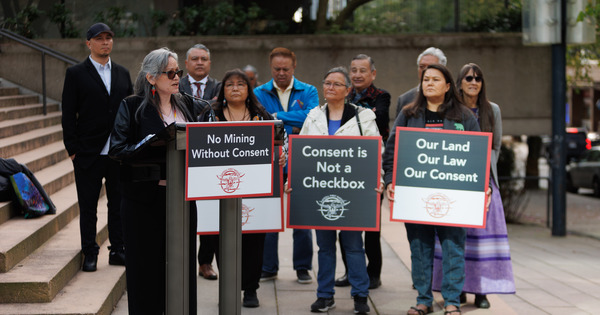British Columbia authorities have granted approval for the expansion of the Mount Polley copper-gold mine, marking a significant development for a site previously associated with one of Canada’s worst environmental disasters.
The provincial government announced Thursday that Imperial Metals Corp. has received the necessary permits to extend mining operations at the site located in central British Columbia, approximately 400 kilometers northeast of Vancouver. The approval allows for the exp
...
British Columbia authorities have granted approval for the expansion of the Mount Polley copper-gold mine, marking a significant development for a site previously associated with one of Canada’s worst environmental disasters.
The provincial government announced Thursday that Imperial Metals Corp. has received the necessary permits to extend mining operations at the site located in central British Columbia, approximately 400 kilometers northeast of Vancouver. The approval allows for the expansion of the existing pit and development of a new mining area, extending the operation’s lifespan by more than five years.
The mine, which has operated intermittently since the catastrophic 2014 tailings dam collapse, will now be able to maintain production until at least 2030, according to company officials. Provincial regulators indicated the expansion would help preserve approximately 300 jobs in the region while implementing enhanced environmental safeguards.
“This expansion comes with stringent conditions that prioritize environmental protection while supporting responsible resource development,” said Josie Osborne, BC’s Minister of Energy, Mines and Low Carbon Innovation. “We’ve worked closely with First Nations and incorporated their feedback throughout the approval process.”
The Mount Polley mine gained international notoriety in August 2014 when its tailings storage facility failed, releasing approximately 25 million cubic meters of mining waste and contaminated water into Polley Lake, Hazeltine Creek, and Quesnel Lake. The disaster devastated local waterways and wildlife habitat, with environmental impacts still being monitored today.
Imperial Metals temporarily suspended operations following the disaster but resumed limited production in 2016 after extensive remediation efforts. The mine operated until 2019 when it was placed on care and maintenance due to declining copper prices. Operations restarted again in 2021 amid strengthening metal markets.
Industry analysts note the expansion approval comes at a strategic time, as global demand for copper continues to increase, driven by the renewable energy transition and electrification trends. Copper prices have risen approximately 12 percent since January, currently trading near $10,000 per tonne.
“Copper is absolutely critical for the clean energy transition,” said Michael Goehring, president of the Mining Association of British Columbia. “Responsible copper production in jurisdictions with strong environmental standards like BC is essential to meet growing global demand while ensuring supply chain security.”
The expansion plan includes several environmental protection measures directly addressing concerns stemming from the previous tailings failure. The company has committed to utilizing the existing tailings facility with enhanced monitoring systems and will implement dry-stack tailings technology for a portion of future waste storage, considered a safer alternative to conventional wet tailings storage.
Local reactions to the approval have been mixed. The Williams Lake First Nation, whose traditional territory includes the mine site, expressed cautious support after negotiating an enhanced environmental monitoring agreement with Imperial Metals.
“We remain vigilant about protecting our waters and lands,” said Chief Willie Sellars. “While we acknowledge the economic benefits this operation brings to our region, we’ve secured commitments for independent environmental oversight and greater involvement in operational decisions.”
Environmental organizations have criticized the decision, arguing that Imperial Metals has not fully addressed the long-term impacts of the 2014 disaster. MiningWatch Canada expressed concern that the expansion approval came before the completion of comprehensive post-disaster ecological studies in Quesnel Lake.
“We’re still learning about the environmental consequences of the original disaster,” said Ugo Lapointe, Canadian program coordinator for MiningWatch. “Approving an expansion before fully understanding those impacts seems premature and potentially risky.”
The BC Environmental Assessment Office noted that the expansion underwent rigorous technical review, including evaluations of water management plans, geotechnical stability assessments, and reclamation strategies. The approval includes 95 legally binding conditions Imperial Metals must follow throughout the mine’s extended operational life.
The Mount Polley expansion represents part of a broader trend in British Columbia’s mining sector, which has seen increased investment as demand grows for minerals essential to green technology. The province is Canada’s largest copper producer and holds significant reserves of other critical minerals needed for batteries and renewable energy infrastructure.
Imperial Metals expects to begin expansion activities immediately, with full-scale production in the new mining areas anticipated by early 2024. The company has committed to providing quarterly public updates on environmental monitoring data and remediation progress at the site.
Financial markets responded positively to the announcement, with Imperial Metals’ shares rising 8.5 percent in Thursday trading on the Toronto Stock Exchange.


